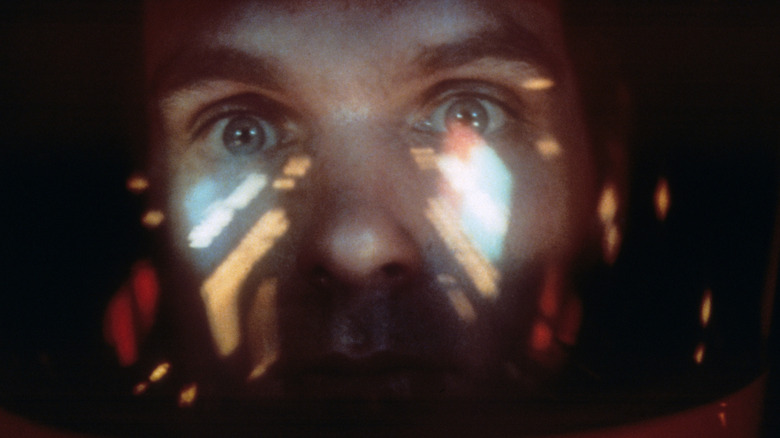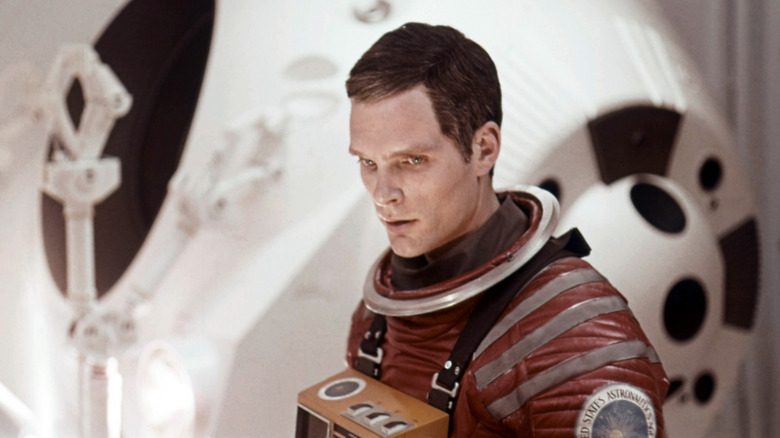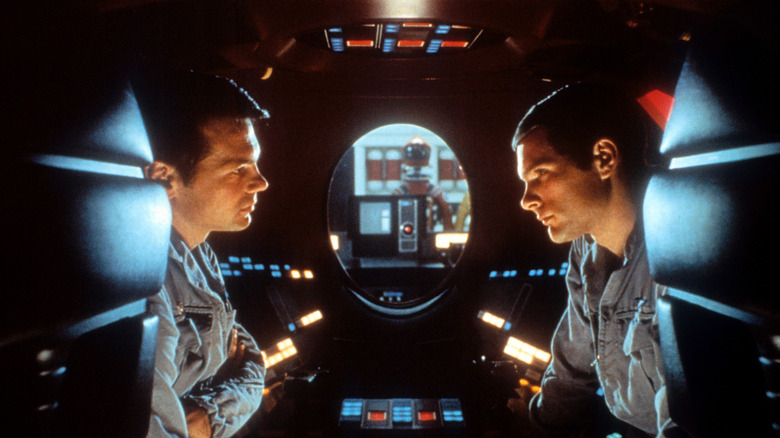The Classic Sci-Fi Movie Roger Ebert Once Called 'A Spiritual Experience'
Genre cinema doesn't always get the appreciation it deserves, but there are those rare movies that completely changed the course of film history. "2001: A Space Odyssey" debuted in 1968 and the world has not been the same since. It instantly became one of the best sci-fi movies of all time, with many considering it a singularly amazing cinematic experience.
The Stanley Kubrick directed movie chronicles how a piece of extraterrestrial technology that looks like a black monolith shaped the course of human history. Much of the film takes place in deep space, where astronauts Dr. David Bowman (Keir Dullea) and Dr. Frank Poole (Gary Lockwood) are searching for the source of the monolith with the help of supercomputer HAL 9000 (Douglas Rain). Famed critic Roger Ebert placed "2001" on his Ten Greatest Films of All Time list, describing it as, "a landmark of non-narrative, poetic filmmaking, in which the connections were made by images, not dialog or plot" while deeming it "a spiritual experience."
More than half a century later, the film still boasts some of the most impressive visual effects you'll ever see. There's good reason for Ebert's praise, and once you take a closer look at "2001," you'll see that its legacy still holds strong today.
Ebert believed 2001 was one of the few transcendent films out there
The fact that "2001: A Space Odyssey" is as powerful an experience in the 2020s as it was in the 1960s is a testament to the work that went into it. Stanley Kubrick and Arthur C. Clarke invented a story that's both suggestive and haunting, but the plot isn't what makes it special. The phenomenal score from Alex North combined with the genuinely mind-bending visual effects from artist Douglas Trumbull broke new ground while elevating "2001" to an incredible degree.
Writing about the film in 1997, Roger Ebert said, "This is the work of an artist so sublimely confident that [Kubrick] doesn't include a single shot simply to keep our attention." Ebert praised Kubrick's restraint and his combining of various elements to create a work of art that goes well beyond pure entertainment. "Only a few films are transcendent, and work upon our minds and imaginations like music or prayer or a vast belittling landscape," Ebert added. "2001" is without a doubt one of those films, which is why so many have deemed it one of the greatest movies of all time.
The Space Odyssey legacy
Roger Ebert is far from alone in his love of "2001: A Space Odyssey." To this day, fans continue puzzling through all the confusing moments in "2001" in search of deeper meaning. In addition, countless people in the film industry were inspired by what Kubrick and company accomplished in 1968.
Celebrating the film's 50th anniversary in 2018, The Guardian talked to some of those most influenced, such as "The Dark Knight" and "Inception" cinematographer Wally Pfister. "It was wonderfully influential as I got into film, and started appreciating it technically," Pfister shared, adding, "It took 40 years for visual effects to catch up with what they did." John Gaeta, visual effects supervisor for "The Matrix," said, "I could dot-connect where I am today back to being a young man watching 2001." The movie's influence even went beyond the film world. "2001" visual effects supervisor Douglas Trumbull shared, "I meet scientists, engineers and astrophysicists almost every week who say they went into their line of work because they watched the film when they were young."
There are ways to keep the experience going, whether by watching Kubrick's other films, reading Arthur C. Clarke's many sequel novels, or even viewing the 1984 film follow-up "2010: The Year We Make Contact." But even decades later, nothing touches the ambitious imagination of the original "2001: A Space Odyssey."


